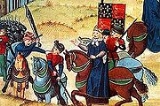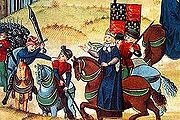
Wat Tyler
Encyclopedia

Peasants' Revolt
The Peasants' Revolt, Wat Tyler's Rebellion, or the Great Rising of 1381 was one of a number of popular revolts in late medieval Europe and is a major event in the history of England. Tyler's Rebellion was not only the most extreme and widespread insurrection in English history but also the...
of 1381.
Early life
Knowledge of Tyler's early life is very limited, and derives mostly through the records of his enemies. Historians believe he was born in EssexEssex
Essex is a ceremonial and non-metropolitan county in the East region of England, and one of the home counties. It is located to the northeast of Greater London. It borders with Cambridgeshire and Suffolk to the north, Hertfordshire to the west, Kent to the South and London to the south west...
, but are not sure why he crossed the Thames Estuary
Thames Estuary
The Thames Mouth is the estuary in which the River Thames meets the waters of the North Sea.It is not easy to define the limits of the estuary, although physically the head of Sea Reach, near Canvey Island on the Essex shore is probably the western boundary...
to Kent
Kent
Kent is a county in southeast England, and is one of the home counties. It borders East Sussex, Surrey and Greater London and has a defined boundary with Essex in the middle of the Thames Estuary. The ceremonial county boundaries of Kent include the shire county of Kent and the unitary borough of...
. Local tradition in Brenchley
Brenchley
Brenchley is a village and civil parish in the Borough of Tunbridge Wells, Kent, England.-History:The name is historically derived from Branca's Leigh. The parish is located east of Tunbridge Wells, and south of Paddock Wood, and includes the neighbouring village of Matfield...
was that he was born there.
The Peasants' Revolt
With news of rebellions of the upper classes in France and FlandersFlanders
Flanders is the community of the Flemings but also one of the institutions in Belgium, and a geographical region located in parts of present-day Belgium, France and the Netherlands. "Flanders" can also refer to the northern part of Belgium that contains Brussels, Bruges, Ghent and Antwerp...
, the English readied for an insurrection. John Ball
John Ball (priest)
John Ball was an English Lollard priest who took a prominent part in the Peasants' Revolt of 1381. In that year, Ball gave a sermon in which he asked the rhetorical question, "When Adam delved and Eve span, who was then the gentleman?".-Biography:Little is known of Ball's early years. He lived in...
, Jack Straw
Jack Straw (rebel leader)
For other uses, see Jack Straw Jack Straw was one of the three leaders of the Peasants' Revolt of 1381, a major event in the history of England.-Biography:Little is known of the Rising's leaders. It been suggested that Jack Straw may have been a preacher...
and others advocated the destruction of the hierarchical feudal system. Ball, like Tyler, held egalitarian values, though the medieval historian Jean Froissart
Jean Froissart
Jean Froissart , often referred to in English as John Froissart, was one of the most important chroniclers of medieval France. For centuries, Froissart's Chronicles have been recognized as the chief expression of the chivalric revival of the 14th century Kingdom of England and France...
describes Ball as insane. Other contemporaries suggest that he was involved with the Lollard movement. Such harsh, often unfounded attitudes toward the rebels are common among chroniclers, given that the latter belonged to the educated upper classes, who were usually the targets of rebellion rather than supporters of it. Thus, it is difficult to get an accurate sense of the actual aims and goals of rebels as their side of the story is not represented in historical accounts. Despite this difficulty, Tyler's name does appear in many monk scripts that were discovered throughout the years.
Richard II
Richard II of England
Richard II was King of England, a member of the House of Plantagenet and the last of its main-line kings. He ruled from 1377 until he was deposed in 1399. Richard was a son of Edward, the Black Prince, and was born during the reign of his grandfather, Edward III...
ascended to power after the death of Edward III
Edward III of England
Edward III was King of England from 1327 until his death and is noted for his military success. Restoring royal authority after the disastrous reign of his father, Edward II, Edward III went on to transform the Kingdom of England into one of the most formidable military powers in Europe...
; he was only 14 at the time of the rebellion. Since he was a minor, the Dukes of Lancaster
John of Gaunt, 1st Duke of Lancaster
John of Gaunt, 1st Duke of Lancaster , KG was a member of the House of Plantagenet, the third surviving son of King Edward III of England and Philippa of Hainault...
, York
Edmund of Langley, 1st Duke of York
Edmund of Langley, 1st Duke of York, 1st Earl of Cambridge, KG was a younger son of King Edward III of England and Philippa of Hainault, the fourth of the five sons who lived to adulthood, of this Royal couple. Like so many medieval princes, Edmund gained his identifying nickname from his...
, and Gloucester
Thomas of Woodstock, 1st Duke of Gloucester
Thomas of Woodstock, 1st Duke of Gloucester, 1st Earl of Buckingham, 1st Earl of Essex, Duke of Aumale, KG was the thirteenth and youngest child of King Edward III of England and Philippa of Hainault...
governed in his name. These officials were the main targets of the rebels, who held that they were traitors to the king and undermined his authority. Several unsuccessful expeditions against France added to the burden on the English working class. The government resolved on a poll tax
Poll tax
A poll tax is a tax of a portioned, fixed amount per individual in accordance with the census . When a corvée is commuted for cash payment, in effect it becomes a poll tax...
of three groats, which outraged the people because it was the same for rich and poor
Fixed tax
A fixed tax is a lump sum tax that is not measured as a percentage of the tax base . Fixed taxes like a poll tax or sin tax are often considered regressive, but could have progressive effects if applied to luxury goods and services.Since citizens share common roads, military protection, policing,...
.
Reacting to the introduction of the oppressive poll tax, which the king had imposed because not enough income had been collected the previous year, Tyler led a mixed group "a very great number of [whom] were not simply peasants but village craftsmen and tradesmen" (The Peasants Revolt of 1381, R.B.Dobson, ed.), in taking Canterbury
Canterbury
Canterbury is a historic English cathedral city, which lies at the heart of the City of Canterbury, a district of Kent in South East England. It lies on the River Stour....
, before advancing on to Blackheath, outside London. Tyler then entered the city of London at the head of a group estimated at numbering over 50,000. After crossing London Bridge without resistance, the rebels then gained entry to the Tower of London and captured Simon Sudbury
Simon Sudbury
Simon Sudbury, also called Simon Theobald of Sudbury and Simon of Sudbury was Bishop of London from 1361 to 1375, Archbishop of Canterbury from 1375 until his death, and in the last year of his life Lord Chancellor of England....
, the unpopular Archbishop of Canterbury, before proceeding to behead him and several of his followers. The rebels also destroyed the Savoy palace during subsequent rioting and killed the king's uncle. Richard of Wallingford
Richard of Wallingford (constable)
Richard of Wallingford , constable of Wallingford Castle and landowner in St Albans, played a key part in the English peasants' revolt of 1381. Though clearly not a peasant, he helped organise Wat Tyler’s campaign, and was involved in presenting the rebels’ petition to Richard II...
presented a charter to King Richard II on behalf of Tyler. The king met the rebel army at Mile End
Mile End
Mile End is an area within the East End of London, England, and part of the London Borough of Tower Hamlets. It is located east-northeast of Charing Cross...
and promised to address the people's grievances, which included the unpopular taxes.
Twenty thousand people assembled at Smithfield
Smithfield, London
Smithfield is an area of the City of London, in the ward of Farringdon Without. It is located in the north-west part of the City, and is mostly known for its centuries-old meat market, today the last surviving historical wholesale market in Central London...
. Richard II agreed to meet the leaders of the revolt, and listen to their demands. Wat Tyler decided to ride out alone and parley with the King. What was said between Wat Tyler and the King is largely conjecture and little is known of the exact details of the encounter; however, by all accounts the unarmed Tyler was suddenly attacked without warning and killed by the Lord Mayor of London, Sir William Walworth
William Walworth
Sir William Walworth , was twice Lord Mayor of London . He is best known for killing Wat Tyler.His family came from Durham...
and John Cavendish
John Cavendish
Sir John Cavendish of Cavendish came from Cavendish, Suffolk, England. He and the village gave the name Cavendish to the aristocratic families, of the Dukedoms of Devonshire, Newcastle and Portland.-Biography:...
, a member of the king's group. This unprovoked betrayal of the truce flag and Tyler's killing threw the people into a panic. Not being organized as a military force, they broke and began to flee for their lives.
See also
- John BallJohn Ball (priest)John Ball was an English Lollard priest who took a prominent part in the Peasants' Revolt of 1381. In that year, Ball gave a sermon in which he asked the rhetorical question, "When Adam delved and Eve span, who was then the gentleman?".-Biography:Little is known of Ball's early years. He lived in...
– co-leader of 1381 Peasants' Revolt - Jack CadeJack CadeJack Cade was the leader of a popular revolt in the 1450 Kent rebellion during the reign of King Henry VI in England. He died on the 12th July 1450 near Lewes. In response to grievances, Cade led an army of as many as 5,000 against London, causing the King to flee to Warwickshire. After taking and...
– leader of 1450 Kentish Revolt - Jack StrawJack Straw (rebel leader)For other uses, see Jack Straw Jack Straw was one of the three leaders of the Peasants' Revolt of 1381, a major event in the history of England.-Biography:Little is known of the Rising's leaders. It been suggested that Jack Straw may have been a preacher...
– co-leader of 1381 Peasants' Revolt - Robert KettKett's RebellionKett's Rebellion was a revolt in Norfolk, England during the reign of Edward VI. The rebellion was in response to the enclosure of land. It began in July 1549 but was eventually crushed by forces loyal to the English crown....
– leader of 1549 Norfolk Rebellion - Bartholomew SteerBartholomew SteerBartholomew Steer was an unsuccessful rebellion leader in Oxfordshire, England. He was a carpenter, born in Hampton Poyle, Oxfordshire, brother to a weaver. In 1596, the area was suffering through famine and increasing poverty...
– leader of 1596 Oxfordshire Rebellion
External links
- Wat Tyler Country Park
- Wat Tyler on historyguide.org — a description, from a chronicle of the time, which relates the final meeting between Wat Tyler and King Richard II.
- EASF radical history wiki An East Anglia-specific look at the rebellion

